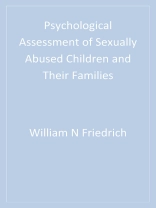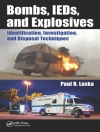‚If you do any forensic child sexual abuse evaluation, you need to read this book. In a carefully documented, well written text it sets the standard for abuse assessment. Not only does it advocate an integrated approach to evaluation that includes information on the child, the child′s context and the child′s relationships, but it goes on to offer clear and helpful directions for gathering this information. A generous sprinkling of relevant case histories links theory to practice. This excellent book is a much needed contribution to the arena of psychological assessment in child sexual abuse.‘
— SANDRA K. HEWITT, Ph.D. Private Practice, St. Paul, Minnesota
‚In this book, Dr. Friedrich provides a thorough guide to assessing the constructs central to his three-part model for directing the treatment of sexually abused children and their families. What distinguishes this volume from others like it is Friedrich′s attention to the complexity of assessing theoretically critical aspects of child and family functioning, the practicality of the techniques described, and the wisdom of the author. The generous inclusion of many scales, interviews, and clinical aides should facilitate the application of Friedrich′s ideas among experienced and novice clinicians.‘
— DANIEL W. SMITH, Ph.D., Research Assistant Professor & Director of Training
National Crime Victims Research & Treatment Center
Medical University of South Carolina
‚ I am extremely impressed with Dr. Friedrich′s latest book. This is the definitive volume on the assessment of sexually abused children and adolescents. Rich in data, clinical information, and compassion, this book far exceeds anything also written on the topic to date. Although geared toward sexual abuse victims, there is much here for those who assess other forms of childhood victimization as well.’
— JOHN BRIERE, Associate Professor of Psychiatry,
and Director, Psychological Trauma Clinic
‚ Although much has been written about how to treat sexually abused children and their families, the literature is scarce with regard to the psychological assessment of this population. Friedrich has produced a volume that not only fills the gap in this area but one that will likely become a landmark in the field. Friedrich places great emphasis on empirically validated assessment strategies along with a solid theoretical foundation in the areas of attachment, self-perception, and dysregulation. Yet this book is rich with clinical material that will be of great value to practicing clinicians. Friedrich reminds us that before we treat sexually abused children, assessment is critical so that we know what we are treating. This is an outstanding contribution that will be a wonderful resource for all professionals in the field.‘
— ANTHONY P. MANNARINO, Allegheny General Hospital, Pittsburgh, PA
Designed for professionals in the field of child maltreatment, this authoritative book presents a compelling theoretical framework that guide′s assessment of children and adolescents who have been sexually abused and their parents. The book is designed to make it easier for clinicians to select a number of measures or procedures across three dimensions that have considerable clinical relevance – attachment, dysregulations, and self-perception. Psychological Assessment of Sexually Abused Children and Their Families features in particular the assessment of sexually aggressive children and an extensive set of interview formats, checklists, and other forms that clinicians will find especially useful in evaluating children and their families. The book is also richly illustrated with case studies.
Inhaltsverzeichnis
Introduction
1. The Purposes of the Psychological Evaluation of Sexually Abused Children and Adolescents
2. Theoretical Framework for Assessment
3. Variability in Sexually Abused Children
4. Attachment Related Assessment
5. Assessment of Dysregulation
6. Evaluation of Sexual Behavior Problems
7. Assessment of Self-Perception
8. Screening
Über den Autor
William N. Friedrich, Ph.D., is a Professor in the Mayo Medical School and a Consultant at the Mayo Clinic in Rochester, Minnesota. He is also a core faculty member of the Eastern European Children′s Mental Health Salvation. He is a diplomate in clinical and family psychology with the American Board of Professional Psychology. His position at the Mayo Clinic includes clinical practice with maltreated children and their families, forensic evaluations, supervision and training, as well as programmatic research in the areas of child and adolescent sexual behavior, the validity of assessment with maltreated and traumatized children, and the function of family environment features in parent-child relations on the short-term and longer-term adjustment of sexually aggressive children. He is the author of 145 papers and chapters; eight books, including the unpublished Treating Sexualized Behavior in Children: A Treatment Manual; and more than a dozen short stories. He is married and the father of two adult children.












